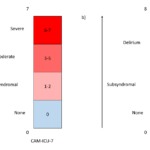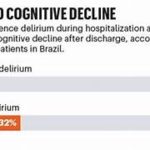Leah Acker, MD, PhD, Assistant Professor of Anesthesiology, Duke University Medical Center, Durham, NC Outside of the delirium field, less complex physiological output signals often are associated with increased risk of geriatric syndromes. For example, an increased risk of falls is associated with less complex musculoskeletal adjustment movements.1 Overall, less complex physiological signals are associated […]
Category Archives: Delirium Research
Does Treating Incident ICU Delirium with Haloperidol Improve Outcomes?
Matthew S. Duprey, PharmD, PhD, BCCCP Investigator, Department of Health Services, Policy, and Practice, Brown University School of Public Health Practitioners familiar with delirium and its consequences have long sought a medication-based treatment to reduce its severity and duration in hospital and also improve post-hospitalization outcomes including long-term cognitive impairment. Despite three randomized controlled trials […]
Answers to some Frequently-Asked-Questions about the NIDUS II Pilot Awards
[updated 10/6/22] Applications for the 2023 NIDUS II Pilot Grant Awards are due Friday, May 5, 2023, 5:00PM EST. We have compiled responses to some NIDUS II Pilot Grant FAQs here to help assist applicants during the process. If you have additional questions or would like further clarification, then please contact NIDUS@hsl.harvard.edu. Also, applicants may […]
Frailty, Postoperative Delirium and Cognitive Dysfunction: Where is the Association?
Contributed by Elizabeth Mahanna-Gabrielli, MD Department of Anesthesiology, Miller School of Medicine, University of Miami, Miami, Florida As a neuroanesthesiologist and intensivist, I’ve seen many frail patients come into the operating room and intensive care unit. During the early years of my career, frailty was informally defined as patient who was elderly, weak, and deconditioned; clinicians […]
Cognitive Prehabilitation to Prevent Postoperative Delirium
Contributed by Brian O’Gara MD MPH Department of Anesthesiology, Beth Israel Deaconess Medical Center, Boston, MA Postoperative delirium occurs in 15-50% of older surgical patients, and increases the risk of postoperative complications, hospital mortality and long-term cognitive dysfunction.1 Hospital -based multicomponent interventions can prevent postoperative delirium, but these approaches are only 30-40% effective.2 Therefore, there is […]
Studying Delirium in the Neurocritical Care Unit: Improving Detection and Outcomes in Patients with Stroke
Michael Reznik, MD Assistant Professor of Neurology & Neurosurgery. Brown University, Alpert Medical School I’ve been interested in brain science, consciousness, and cognition for as long as I can remember, and it was through the lens of these interests that I opted to pursue a career in neurology. I found myself especially interested in patients […]
Discordance between ICDSC and CAM-ICU-7 as measures of delirium severity in the ICU
Karla D. Krewulak PhD and Kirsten M. Fiest PhD Department of Critical Care Medicine, University of Calgary, Calgary, AB, Canada Determination of delirium presence or absence may no longer be sufficient when tools exist to measure a delirium score which may be used to estimate delirium severity. Measurement of delirium severity has been identified as […]
Does Sleep Deprivation Cause Delirium? Exploring the Physiologic Links
Contributed by Shawniqua Williams Roberson, M.Eng., M.D., Departments of Neurology and Biomedical Engineering, Vanderbilt University Medical Center, Nashville, TN. Dr. Williams is a graduate of the 2019 NIDUS Bootcamp. Many of us are familiar with the feeling of not getting enough sleep. Perhaps a storm rattled the windows all night, or the baby couldn’t stop crying. […]
Delirium, Dementia, and Adverse Outcomes
Contributed by Thiago J. Avelino-Silva, MD, PhD*; Flávia B. Garcez, MD, PhD* *Faculty of Medicine, University of São Paulo, São Paulo, Brazil Delirium results from an intricate combination of dozens of possible predisposing and precipitating factors1. Older age, functional dependence, and preexisting cognitive impairment are key determinants for its occurrence, but the latter is a […]
Beyond delirium: The neuropsychiatric dimensions of COVID-19
Contributed by Mark Oldham, MD Assistant Professor – Department of Psychiatry, University of Rochester Medical Center, Rochester, NY The data are clear and, sadly, just as clearly predictable.1,2 COVID-19 has caused delirium—lots of it in fact. Twenty to 30% of older adults with COVID-19 develop delirium, with older adults at higher risk of delirium than […]








